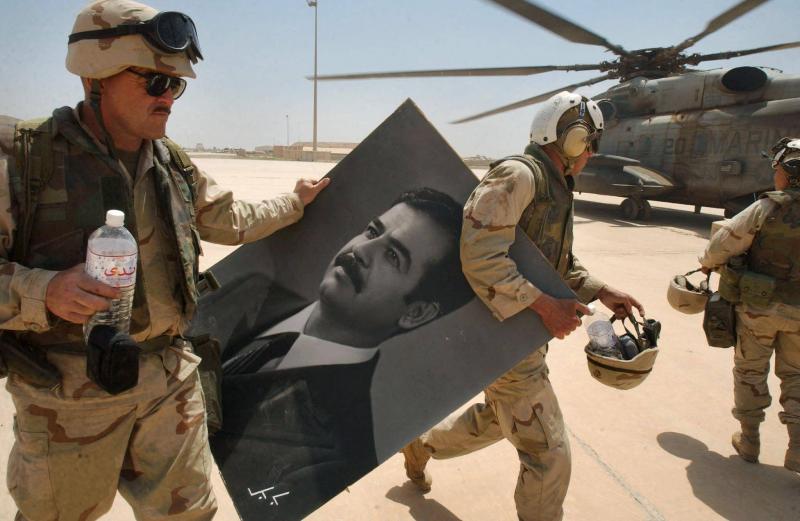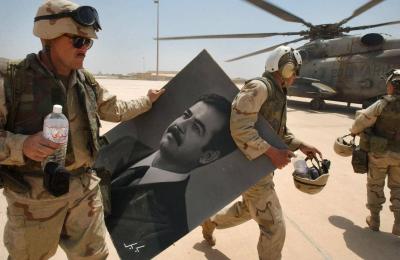Saddam Hussein asked his government: "If America establishes a new government in Kabul according to its desires, will this end the war? The problems of the Afghan people? No... it will add more reasons for what is called terrorism rather than eliminate it."
The American newspaper "The New York Times" relied on the "model" of Saddam Hussein in a report that attempts to answer the question about the reasons that cause dictators to confuse U.S. presidents and American analysts and their calculations, considering that part of the American failure and worst foreign policy stemmed from Washington's misunderstanding of Saddam's personality and way of thinking. The report considered that the United States made the "worst mistake in its foreign policy in the post-Cold War era" when it invaded Iraq in 2003 with the aim of dismantling Saddam Hussein's weapons of mass destruction, but the war cost a heavy toll in the lives and resources of Iraqis and Americans, also strengthening Iran and heating up regional proxy conflicts that trapped Washington in the Middle East, an unpleasant discovery that the Biden administration has come to understand.
The American report stated that while the United States identified dictatorships in China and Russia as the most important challenge to American national security, and while North Korea's isolated leader possesses nuclear weapons and intercontinental missiles, the case of Saddam Hussein provides a rare and well-documented study of why authoritarian leaders often confuse American analysts and presidents. After questioning how the American invasion of Iraq could have been avoided, it pointed to manipulated and false intelligence concerning weapons of mass destruction in Iraq, President George Bush's options, the promotion of war, and media complicity, but it added that the central question of "why did Saddam Hussein sacrifice his long rule in power, and ultimately his life, by creating the impression that he possessed dangerous weapons while he did not" has rarely been scrutinized.
The report indicated that Saddam Hussein recorded his private leadership conversations with the same seriousness that Richard Nixon did, having left behind about two thousand hours of recordings along with a massive archive of meeting minutes and presidential records, as these materials document the thought processes of the Iraqi president during critical shifts in his long conflict with Washington, including his personal reactions to the events of September 11 and the Bush administration's plans to overthrow him. This documented lecture clarifies the complex issue of his inability to convince UN inspectors and multiple intelligence agencies and many world leaders that he did not possess weapons of mass destruction.
The report continued that the recorded tapes show that while Saddam Hussein spoke about global issues, his colleagues rarely dared to interrupt him, adding that Saddam appeared intelligent and impressively insightful. For instance, in October 2001, just days after Bush declared war on al-Qaeda and the Taliban, Saddam asked his government: "If America establishes a new government in Kabul according to its desires, will this end the war? The problems of the Afghan people? No... it will add more reasons for what is called terrorism rather than eliminate it."
The report noted that in the face of American hostility, Saddam resorted to maneuvers and deception, driven by two goals: to remain in power and to achieve glory in the Arab world, preferably by striking Israel. It added that Saddam held strong racist beliefs about Jews and immersed himself in conspiracy theories regarding American and Israeli power in the Middle East, believing that successive American presidents were under Zionist influence and conspired secretly and continuously with hardline ayatollahs in Iran to weaken Iraq.
The report stated that the Iran-Contra conspiracy during the 1980s, when America briefly partnered with Israel to sell arms to the Khomeini regime, reinforced Saddam Hussein's convictions for years to come. However, the report said that Saddam never considered that "Iran-Contra" represented a series of reckless foreign policy incompetence on America's part. According to the report, the reasons behind Saddam Hussein's failure to clarify that he did not possess weapons of mass destruction in the period leading up to 2003 lie in his tragic decades-long conflict with Washington, his unreliable and hidden cooperation with the CIA during the 1980s, the Gulf War of 1990-1991; the UN-backed struggle over Iraq's disarmament that followed, and the confrontation after September 11.
The report stated that shortly after the First Gulf War, Saddam secretly ordered the destruction of his chemical and biological weapons, as demanded by Washington and the UN, hoping this move would allow Iraq to bypass disarmament inspections, but he hid what he had done and repeatedly lied to the inspectors, also not telling the truth to his officers for fear of provoking internal or external attacks.
The report continued that Saddam's decision to comply with international demands and lie about it to UN inspectors presents a challenge to Western logic. It explained that Saddam Hussein would not accept being publicly humiliated, among other reasons, as he believed this wouldn't succeed. He told one of his associates that "one of the mistakes some people make is that when the enemy decides to harm you, you think there is a chance to minimize damage by acting a certain way... but the damage will not be less."
The report elaborated that Saddam believed that the CIA "knew everything," thus, especially after the September 11 attacks, when Bush accused him of hiding weapons of mass destruction, Saddam assumed that the "CIA" already knew he did not possess dangerous weapons, and thus the accusations were merely a pretext for invading Iraq. The report noted that the idea that the "CIA" might have made an analytical error like its failure concerning Iraqi weapons of mass destruction was not part of Saddam's worldview.
The report discussed tapes and files obtained through lawsuits against the Pentagon, some of which were not allowed to be accessed. It stated that some of these documents were invaluable for researchers and the American public's right to know about Saddam's dictatorship.
The report questioned how decision-makers in the United States could have performed better and what lessons their failures might represent today. It continued that the incentives of competitive democratic politics are an equation for demonizing enemies and provide little credit for thinking broadly about the tyrant or contradicting conventional judgments about his motives.
It explained that theoretically, CIA intelligence analysts and those in other American agencies should be able to think freely and provide counsel about the personality and motives of America's deadliest enemies, adding that analysts often fall into groupthink that recycles the prevailing political or public opinion, which explains the intelligence community's misjudgment regarding the weapons of mass destruction possessed by Saddam Hussein.
The report concluded that this policy may not succeed always, and Saddam Hussein's case includes a paradox, noting that Saddam was eccentric to the degree that it would be unwise to counter America's security through guessing his intentions. It added that the optimal policy is to work based on Iraq's capabilities and send clear and convincing deterrent messages. It concluded by stating that ultimately the United States made a miscalculation in estimating its capabilities in weapons of mass destruction, as it failed to understand who Saddam Hussein truly was.




